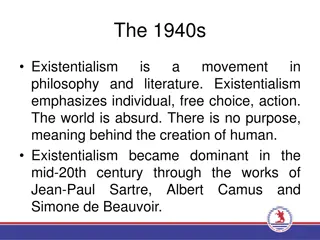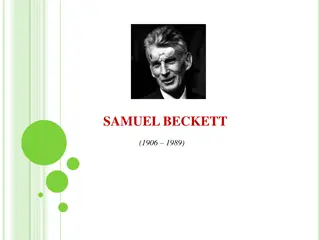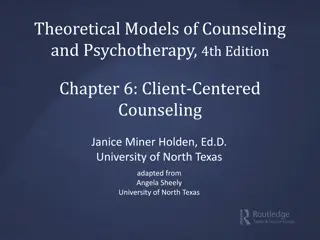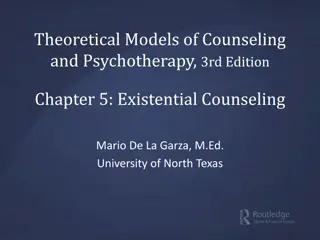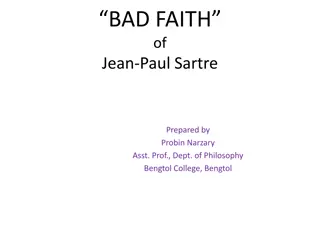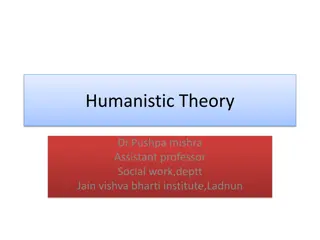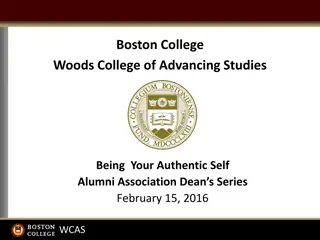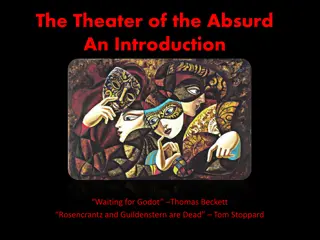Analysis of "Hayavadana" by Girish Karnad: Themes and Cultural Implications
Girish Karnad's play "Hayavadana" explores themes of identity, quest for perfection, and existentialism through a mythical narrative intertwined with cultural implications. The play delves into the ambiguity of human life, the supremacy of the head, and the search for completeness, drawing inspirati
0 views • 11 slides
Literary Movements in the 1940s and 1950s: Existentialism to Angry Young Man
Existentialism emerged as a dominant philosophy in the 1940s, emphasizing individualism and the absurdity of the world. Writers like Samuel Beckett and Iris Murdoch explored these themes in their notable works. In the following decade, the Angry Young Man Movement took hold, challenging societal nor
2 views • 12 slides
The Life and Works of Samuel Beckett: A Literary Journey
Samuel Beckett, an Irish novelist, dramatist, and Nobel laureate, is known for his tragi-comedy and black humor in the Theatre of the Absurd. Born in Dublin in 1906, Beckett's notable works include "Waiting for Godot," "Endgame," and "Molloy." He joined the French Resistance during WWII and won the
0 views • 18 slides
Understanding Carl Rogers' Client-Centered Counseling Approach
Explore the historical overview, philosophical underpinnings, and personality development principles of Carl Rogers' client-centered counseling approach. Learn about Rogers' development of theory, his philosophical influences like phenomenology and existentialism, and key concepts such as actualizin
0 views • 23 slides
Understanding Existential Counseling: Philosophy and Practice
Existential counseling is rooted in the philosophy of existentialism, focusing on concepts such as responsibility, freedom, and the unique subjective perspective of each individual. Rollo May's influence in this approach, along with the ontological and phenomenological underpinnings, shape the under
0 views • 24 slides
Understanding Bad Faith in Jean-Paul Sartre's Existentialism
Sartre's existentialism centers around human freedom and responsibility, emphasizing the importance of personal choice and authenticity. The concept of bad faith arises when individuals evade their responsibility or deceive themselves, hindering their true self-expression. Sartre warns against inaut
0 views • 7 slides
Understanding Humanistic Theory of Personality and its Key Concepts
Humanistic theory emphasizes the active role individuals play in their behavior, with proponents like Abraham Maslow and Carl Rogers. It focuses on humanistic psychology, existentialism, and humanism, emphasizing personal meaning and values. The theory argues for the innate goodness of individuals a
0 views • 8 slides
Exploring Authenticity: Embracing Your True Self
Delve into the concept of authenticity and what it means to be your true self in a world filled with external pressures. From insights by psychologists on self-awareness and ethical action to philosophical perspectives on individuality and existentialism, discover how being authentic relates to pers
0 views • 11 slides
Exploring the Theater of the Absurd: An Introduction to Existentialism in Drama
Delve into the intriguing world of the Theater of the Absurd, a significant theatrical movement of the 1950s rooted in Existentialist philosophy. Discover the essence of Absurdism through illogical plots and characters grappling with the absurdity of existence. Learn about key existentialist concept
0 views • 25 slides

